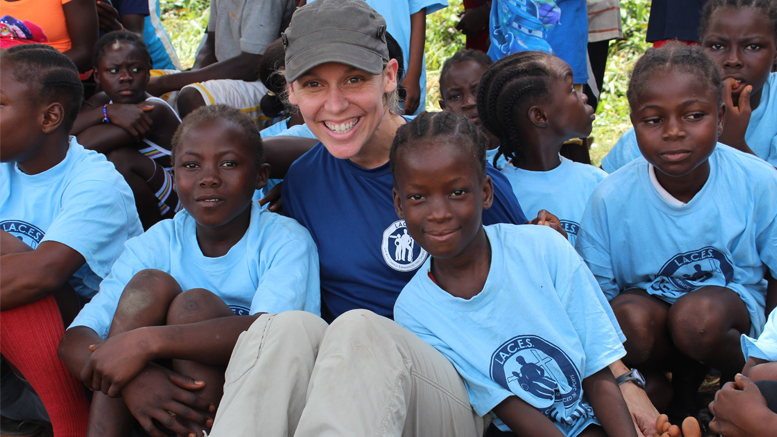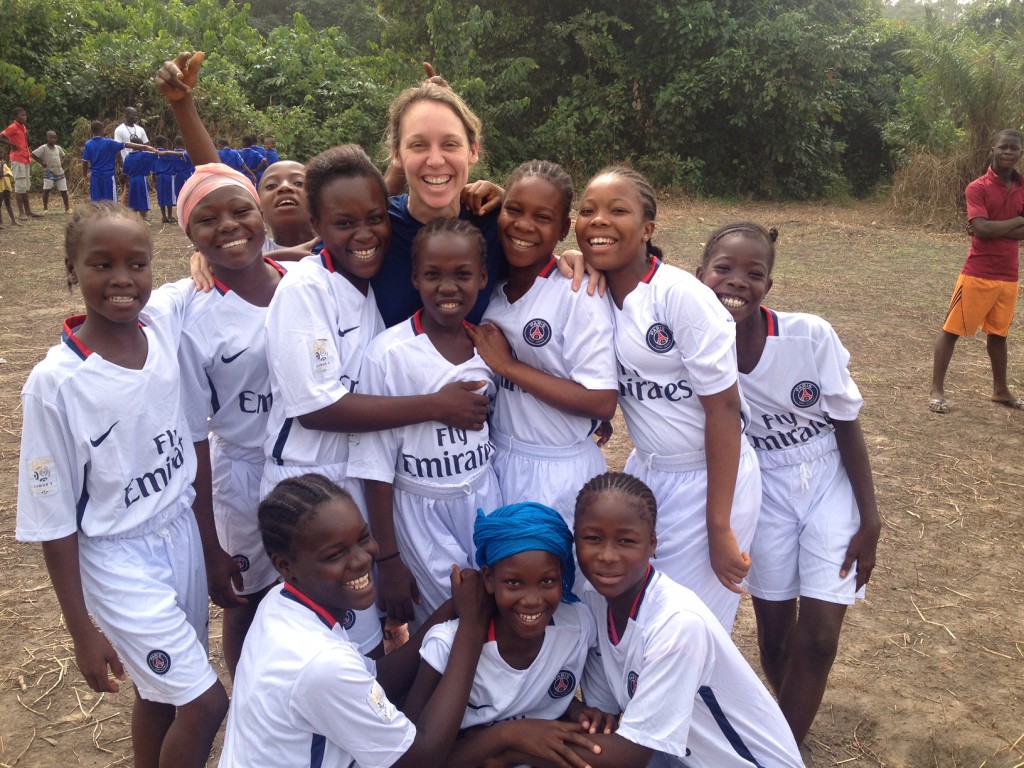By: Brenda Mackey—
Within four days, former Munsonian Seren Frost Fryatt earned two honors: She appeared on Beyond Sport’s list of 50 Most Inspiring People in Sports (along with David Beckham, Muhammed Ali and Billie Jean King) and also earned the organization’s Courageous Use of Sport Award.
Seren today leads an organization that in only nine years has impacted thousands of children, hundreds of coaches and staff members – and even assisted the World Health Organization in taking on the Ebola crisis.
How did a woman from Muncie, Indiana change the world? It started with her desire to help others in need and the support of her community.
Seren understands how important community is because she comes from a strong one. “Muncie is a community that really invests in their people,” she said. “I always felt like everybody said, ‘You can do this.’ They not only said that but they backed it up. Muncie is a community that allows you to think big but also is small enough to say, ‘We know you and want to be a part of this with you.’”
Adrift after college, Seren volunteered in Liberia to help its people after the country’s 14-year civil war ended. At a pickup soccer game, coaches from one of the country’s professional women’s soccer teams noticed Seren’s athletic skills, developed at Delta High School and Indiana Wesleyan University, and she was soon invited to join the team.
She accepted, not knowing how much it would change her life.
Seren began to understand the war’s effects as she got to know her new teammates, spending time in their homes and with their families. She learned that many Liberians killed in the war had left children behind, to be raised by relatives or friends. Children as young as six had been forced to be soldiers, where they were subjected to the horrors of war despite their youth. After the war, they roamed the streets with no supervision from overburdened adults.
Remembering all she had learned from her coaches over the years about teamwork, leadership and perseverance, Seren recognized how bringing sports to Liberia could transform a nation’s children.
L.A.C.E.S.: Life And Change Experienced thru Sports
When Seren returned to the U.S., she began planning for the development of a sports program for the children of Liberia and found immediate support for her venture. Even before she named the organization, Seren was amazed at the initial financial support of her community. “I raised $80,000 on an idea,” she said. “People in Muncie and Chicago, whether they gave $20 or $1000, it was because they believed in an idea, believed that I could do this. There’s something special about the people and organizations in these places. They gave unselfishly and helped birth something that’s been going for nine years.”
Back in Liberia, Seren sought a community she knew the program needed. Her soccer league’s commissioner suggested she launch in Matadi, a town that had both soccer fields and a number of former child soldiers, now ages 10-14.
Seren knew the program had to be run by locals in order to succeed. “I hadn’t lived through 14 years of civil war,” she said. “How do you meet the needs of children who were former child soldiers and bring them back to their childhood? How do you address PTSD through sports?”
Her first task was to find locals to contextualize the idea and build management within the organization. The first two people she brought on, James Moore and Pastor Louis Roberts, have been with L.A.C.E.S. since – but they’ve had to change their mindset over time.
“I found them and they caught on to the mission immediately,” Seren says. “But I don’t know that in the beginning they saw the organization’s long-term vision or how it would play out. For 14 years, they weren’t sure how they would get their daily bread. We had to retrain the idea of planning, that something would be there in two years.”
Nine years later, L.A.C.E.S. has worked with more than 1,000 children, 180 coaches and employs 20 staff members.
A matter of life and death: preventing Ebola’s spread
Ebola appeared in Liberia in March 2014, with a few cases followed by seeming remission. But that July, it resurfaced and spread like wildfire through the area. Infection rates were so high in one community, it was quarantined for 21 days.
Seren’s staff refused to stand by and watch. “They called me one day and said ‘We need to save our people. We’re watching people die, and we think we can prevent that,’” Seren said.
The L.A.C.E.S. team attended a training session led by the World Health Organization and then went to work, printing flyers and knocking on doors – 15,000 of them. Leveraging the infrastructure and relationships they had built to share sports, the 100-person staff kept at it day in and day out until they reached everyone in the communities, starting with the L.A.C.E.S. children and their families.
“It was a big risk for them,” Seren said. “James and Pastor Roberts didn’t live in these communities, but they put themselves at risk every day by interacting with people and then went home to their families. They went months without touching their children because of fear of infecting them. I can’t imagine that – not touching your child. They’re standing in front of you and you can’t touch them because you’re afraid that you will infect and kill your child. But they still had the courage to go out and knock on those doors because they knew what they were doing would ultimately not only save thousands of lives but also save the lives of their own children.”
The efforts and hard work of the L.A.C.E.S. team proved successful. “Ebola was won through prevention, not from people going to Ebola treatment units,” Seren said. “The battle was fought and won through prevention, education and awareness.”
Still in the game
Even though the imminent threat of Ebola has passed, aftereffects remain. “Just because the disease isn’t around doesn’t mean people aren’t still affected by it,” Seren said. She is working with Nancy Writebol, an American missionary and Ebola survivor, to bring trauma healing to children affected by the disease.
L.A.C.E.S. has moved forward on its original goal and formed new partnerships. Seren is now collaborating with Lindsey Blom, associate professor of sport and exercise psychology at Ball State University, and Kendall Cotton Bronk, associate professor of psychology at Claremont Graduate University, who have been awarded a $43,000 grant from the Cohen Foundation to conduct research on L.A.C.E.S. and suggest updates to the program’s curriculum.
“When people have purpose in life, they’re more productive citizens and they make better decisions,” Seren said. “Through sports we’re getting them together and then we’re able to meet their needs in other ways.”
If you are interested in supporting L.A.C.E.S., you may email Seren: sfryatt@laces.org.




